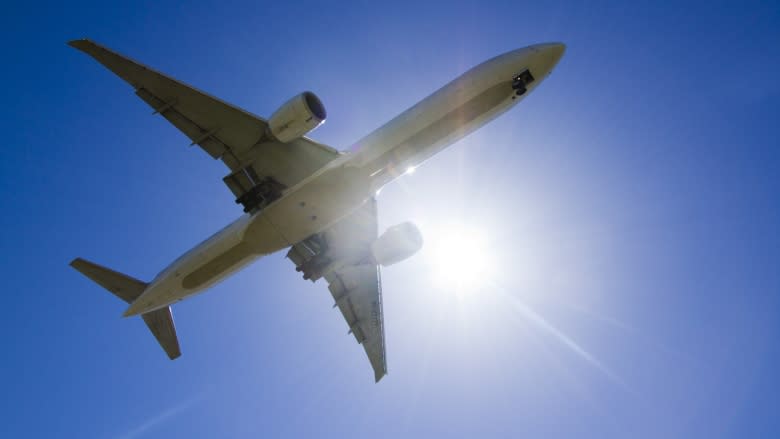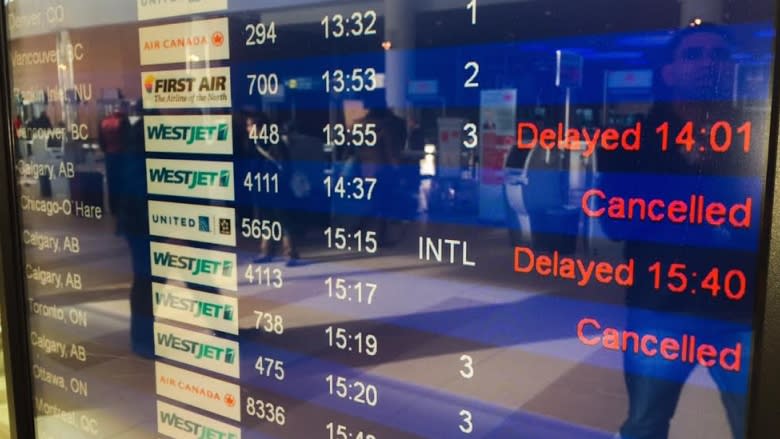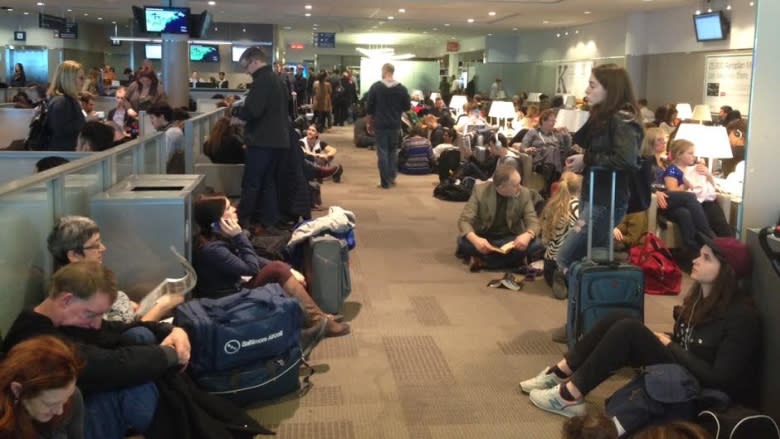Increasingly wild weather could lead to rising air travel costs
Be prepared to pay more for airfare if climate change continues to alter weather patterns, increasing the frequency and severity of storms, say climate change and airline industry experts.
Daniel Scott, a climate professor at the University of Waterloo in Ontario, said travellers should also expect more flight delays and cancellations amid recurring snowstorms, thunderstorms and bouts of freezing rain.
Planes would have to be rerouted more often to avoid bad weather, which would cause them to burn more fuel. Aircraft will also have to be de-iced more often, increasing operational costs for airlines, he said.
"It will get passed along to us as an operational cost one way or the other," said Scott, the university's research chair in climate and society.
"They won't put it as an explicit line item, but it will appear in that fuel surcharge which has never disappeared."
Air Canada started putting in an additional charge in 2007 when oil prices spiked to more than $145 per barrel.
Higher costs could lessen demand for flights
The president and managing director of a Toronto-based aviation advisory firm said airlines would have to increase their fees by at least a few dollars per ticket to cover the additional costs from more stormy weather.
"For customers on, say, a low-cost ticket that don't travel very often, another couple of dollars on top of many other dollars and fees and charges does have a rebound effect and affect demand for travel," said Robert Kokonis of AirTrav Inc.
Brad Cicero, a spokesperson for Porter Airlines, said if an increase in bad weather started costing airlines more money, the decision to pass those costs onto consumers would have to be carefully weighed.
"It's unlikely that any individual airline was going to do that on their own for an extended period of time without seeing everybody else kind of stay in the same ballpark," he said.
"That's what you're comparing to every day — you're watching what everybody else is charging for an individual route. There are so many factors that go into pricing, it's not necessarily going to be influenced by any one thing."
WestJet also said there are numerous factors that go into ticket pricing, and that it wasn't sure how bad weather would factor into what it charges.
Air Canada denied CBC's request for an interview or information on how severe weather impacts its operations.
Climate change already happening
It's not just stormy weather that's causing trouble for airlines.
Last week, a heat wave in Arizona, with temperatures topping 48 C, grounded more than 40 flights of smaller planes and limited ticket sales on larger aircraft to reduce weight.
Scott said we are at the front end of the climate-change wave. The intense snowstorms in Atlantic Canada and Quebec this winter, the flooding in central Canada and parts of the U.S., are all evidence of climate change's current impact.
"We are seeing increased frequency of these types of events," he said. "We would just expect to see more of them, and in some cases more severe events in the decades ahead."
WestJet has run into its share of bad weather this year. In the first quarter of this year, it had 29 irregular operation days where flights were cancelled or delayed — more than it had in the first quarter of 2015 and 2016 combined.
It also used 20 per cent more de-icing fluid this winter. It typically uses about five million litres a year. The airline would not say how much that increase cost the company. However, a spokesperson for WestJet said the company incurred $7 million worth of expenses relating to irregular operations in the first quarter of this year.
More de-icing due to wintry weather
Fraser Neek, senior manager of ground and winter operations for WestJet, said there was an increase in snowfall and colder weather in Vancouver this year, while central Ontario was slightly nicer than usual.
In both Alberta and the country's East Coast, the need for de-icing fluid has increased year over year. But Neek said he doesn't believe the airline has seen a drastic change in how bad weather impacts the way it operates.
Porter Airlines said it has seen no unusual expenses due to bad weather.
The Halifax Stanfield International Airport didn't report any major changes that would impact its operation either.
In the last five years, the airport has spent between $3 million and $4.6 million to maintain operations during the winter, including for snow clearing, sand, salt, fuel and wages.
The winter of 2015 was particularly expensive for the airport, costing it $4.6 million to keep the airport running.




